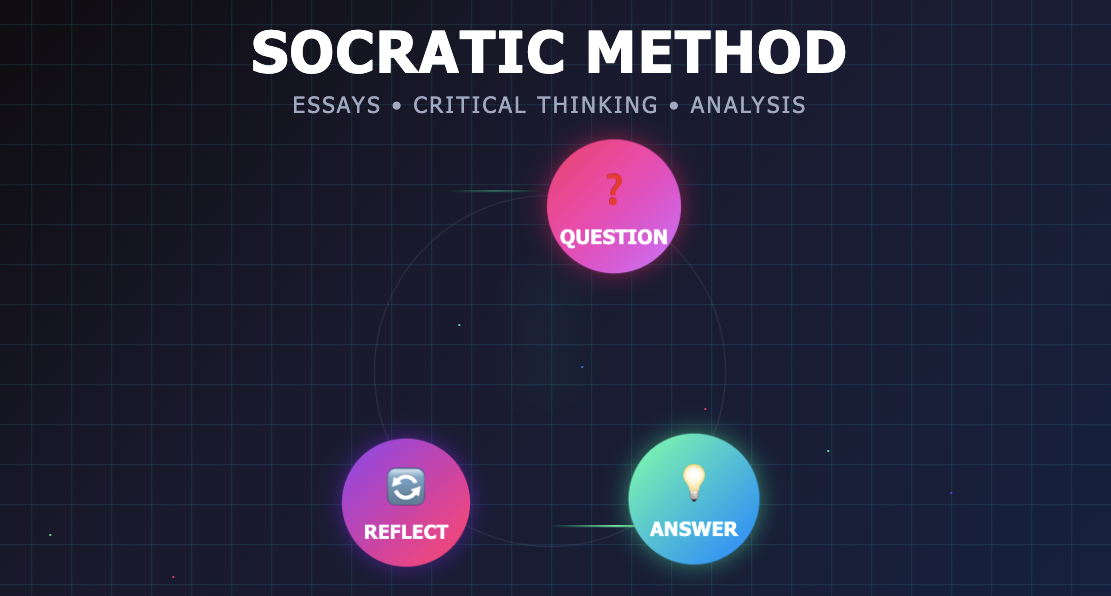
Students often struggle to start essays with impact or depth. The Socratic Method for essays flips the script – it invites you to ask questions instead of just making points. This method empowers students to explore complex ideas, support them with logical reasoning, and reflect deeply at the end.
By learning how to write an essay using the Socratic Method, students build more thoughtful, persuasive, and memorable writing – perfect for college assignments, scholarship essays, and personal statements. Let’s find out why.
What Is the Socratic Essay Structure?
The Socratic Method is a framework based on three core steps:
1. Question – Start with a bold, open-ended inquiry
2. Answer – Respond with logic, evidence, and depth
3. Reflect – Conclude by analyzing what the answer means
In academic writing, this turns your paper into a structured conversation. If you’re feeling overwhelmed, a trusted write my essay website can offer templates that follow similar structures, giving you a strong head start.
Why Use Socratic Questioning Techniques in Essays?
Students benefit from this approach in several ways:
- Improves critical thinking in essay writing
- Encourages multi-angle analysis
- Builds stronger thesis statements
- Produces more engaging conclusions
For reflective writing, such as college applications, this method is especially powerful. It mirrors the kind of self-awareness that admissions officers love. You can see this applied in our guide on How to Write a Personal Statement.
And if you’ve ever thought, “Can someone write an essay for me that sounds like a real thought process?”, the Socratic approach is what makes that happen.
Step 1 – Question: The Essay Begins Here
Strong essays start with big questions, such as:
- “Can technology improve democracy or destroy it?”
- “What does success really mean in college life?”
- “Is digital privacy even possible anymore?”
Asking these kinds of questions brings purpose and direction. Instructors notice when students write my essay for me–style submissions that follow a formula. But Socratic essays stand out by starting with curiosity.
Check out Colorado State University’s Socratic guide to explore how to build better essay questions.
Step 2 – Answer: Building a Logical Dialogue
Each body paragraph should tackle a mini-question and offer a reasoned response:
- Pose a smaller version of your main question
- Share a claim or idea
- Support with quotes, data, examples
- Address counterarguments
- Transition logically to the next idea
This format is great for argumentative essays and makes every paragraph purposeful. Need help shaping these ideas? A reliable website that writes essays for you can offer sample outlines to guide your structure and voice.
It’s not about copying – it’s about learning from well-written templates.
Step 3 – Reflect: Ending with Meaning
Reflection is where students truly shine. Instead of ending with a generic summary, Socratic essays end with new questions, revelations, or personal realizations.
Ask yourself:
- What did you learn from writing this?
- What would you still like to explore?
- Why does this matter in the real world?
This is particularly important in scholarship and admission essays. If you’re unsure how to capture that reflective tone, services that write me an essay with rich conclusions can help you understand what reflection sounds like in writing.
Also check out our guide to scholarship essay writing for examples of reflective writing done well!
When Socratic Doesn’t Fit?
Not every assignment requires the Socratic touch. You may not want to write essay for me in question-answer-reflect mode if you’re submitting:
- Lab reports
- Technical how-to manuals
- Coding documentation
In those cases, linear writing is better. Still, incorporating questions in the brainstorming stage improves structure – something students learn in How to Write a Research Paper.
Smart Writing Tips for Socratic Essays
- Begin with a real question – one you don’t fully know the answer to
- Use headers to guide the dialogue
- Back up every claim with sources
- Include opposing perspectives
- Reflect at the end
- Edit for clarity using our college paper checklist
- And yes, sometimes you need to ask someone to help write an essay when you’re stuck – but always make it your own
Students who try to write a essay for me without thought often miss this. The Socratic method, by contrast, demands attention to thought structure – and it shows.
Track Progress with a Socratic Reflection Log
Writing with depth is a skill. Keep track of the questions that help you think better, so you can reuse them later. This is especially helpful when you’re thinking, “I wish someone could just help me write my essay with more depth.” The truth is, you can train yourself to think like a stronger writer—by reflecting on how your thinking evolves.
Try This: After each essay, write down:
- One question that helped you the most
- One idea that changed while writing
- One insight you gained from reflection
This habit reinforces the mental model that Socratic writing builds: learning through questioning. Tie it into your workflow with tips from our Essay with AI Guide to speed up drafting and leave more time for deeper reflection.
Socratic Writing as a Life Skill
This method isn’t just for essays—it builds intellectual habits that extend into public speaking, leadership, and professional communication.
“The unexamined life is not worth living.”
— Socrates
Writing with Socratic structure helps students ask better questions in interviews, presentations, and even conflict resolution. It’s also a great way to train your brain when you’re looking for resources that help to write an essay that’s both insightful and structured.
Try This: Challenge yourself to write a journal entry each week answering the question: “What belief of mine changed recently – and why?” Then structure your reflection like a mini-essay.
FAQs
1. What is the Socratic Method in essay writing?
It’s a structured approach that uses questions to guide the writing process, enhancing clarity and depth.
2. What types of essays work best with the Socratic Method?
Argumentative, personal, and reflective essays benefit most.
3. How do I write Socratic-style paragraphs?
Pose a question, explore an answer, include evidence, counterpoints, and connect forward.
4. Why is the Socratic Method better than formulaic writing?
It produces more original, thoughtful, and authentic student work.
5. Can I get help learning this method?
Yes, you can find online tools or services that help write my essay online as a teaching guide.
6. Is reflection necessary in every essay?
No – but in Socratic writing, it adds insight that’s often missing from standard conclusions.
Final Thoughts
The Socratic Method teaches students to think before they type. It’s not just about finishing your assignment – it’s about asking better questions, crafting stronger arguments, and finding meaning in your conclusions.
Whether you begin with a spark of curiosity or get inspired by a website that writes essays, always bring the dialogue back to your voice. Thoughtful writing isn’t about sounding smart – it’s about sounding real.




